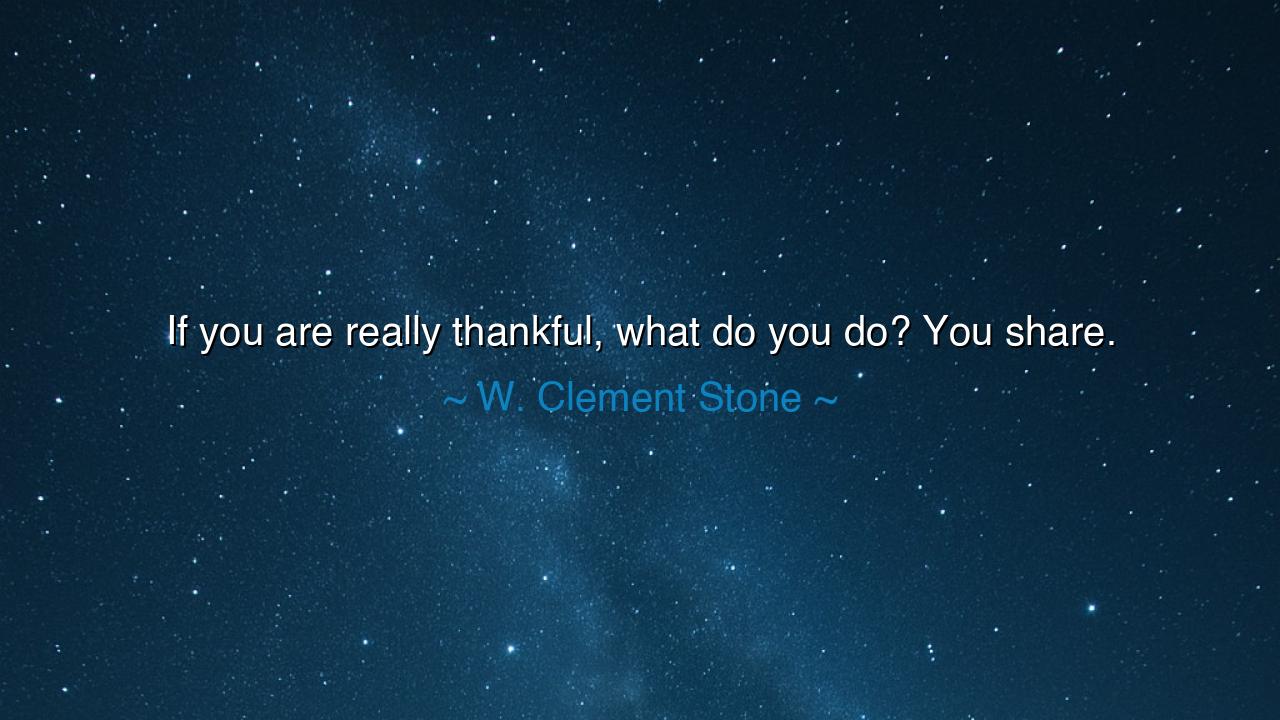
If you are really thankful, what do you do? You share.






Hear the words of W. Clement Stone, a man who lived by the creed of optimism and abundance: “If you are really thankful, what do you do? You share.” These words strike like the tolling of a great bell, reminding us that gratitude is not a silent flame hidden in the heart, but a fire that must spread warmth to others. To be truly thankful is not to hold blessings tight in secret joy, but to open the hand, to give, and to let others partake in what life has granted us.
The ancients knew this truth well. Among the early tribes, when the harvest was gathered, the people feasted together. Gratitude was never solitary, for it was expressed in the act of giving. To hoard was shameful; to share was sacred. Even in scripture, when manna fell from the heavens, each took what they needed, and those who gathered more were commanded to give to those with less. Thus Stone’s words are not new but timeless: thankfulness without sharing is incomplete, like a song half-sung or a prayer left unfinished.
There is also great wisdom in the link between gratitude and generosity. Many claim to be grateful, but their actions reveal only selfishness. True gratitude overflows; it cannot remain still. Like a spring bubbling from the earth, it pours outward to refresh others. When one is deeply thankful, the natural impulse is to extend that blessing—to feed the hungry, to comfort the weary, to teach the unlearned, to uplift the fallen. To share is not an afterthought; it is the living proof that one’s gratitude is genuine.
Consider the tale of Andrew Carnegie, who rose from poverty to immense wealth. Remembering his humble beginnings, he dedicated much of his fortune to building libraries, schools, and institutions of learning. His thankfulness for the opportunities he had been given became visible in his sharing. And through that act of gratitude, countless generations gained access to knowledge and advancement. Carnegie’s story mirrors Stone’s wisdom: gratitude that is real transforms into action that blesses others.
Stone’s words also strike against the illusion of possession. What we hold is never truly ours; wealth, knowledge, time, even love, are gifts that pass through us like the wind across the fields. To be thankful is to recognize this truth, and to share is to align ourselves with the flow of life. Hoarding leads to decay; generosity multiplies. When we give, our gratitude deepens, for we see our blessings reflected in the joy of others.
The origin of this wisdom lies in the very heart of human survival. Without sharing, no community could endure. Hunters shared the kill, villagers shared the well, families shared their bread. Gratitude for life was always expressed through the act of giving to others. W. Clement Stone, though a man of modern times, drew upon this eternal law, reminding us that gratitude which does not reach beyond the self is barren. Gratitude that is fertile always bears the fruit of generosity.
The lesson is plain: test your thankfulness not by your words but by your deeds. Ask yourself: “Do I share what I have been given? Do I allow my gratitude to bless others, or do I hoard it for myself?” For in the act of giving lies the truest expression of gratitude. A thankful heart becomes visible when hands are open and giving, not clenched and grasping.
Practical wisdom calls you to action: when you feel grateful, let that gratitude move your feet and hands. Share your time with the lonely, your food with the hungry, your knowledge with the seeking, your kindness with all. Remember Stone’s challenge: if you are really thankful, you will not remain still—you will share. And in this sharing, gratitude becomes a living force that transforms both the giver and the receiver, echoing across generations like an unending hymn of abundance.






AAdministratorAdministrator
Welcome, honored guests. Please leave a comment, we will respond soon